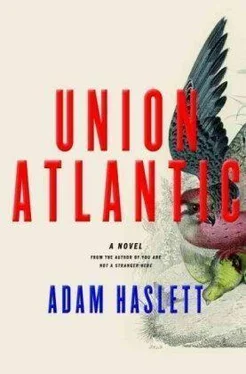Adam Haslett
Union Atlantic
For my mother,
Nancy Faunce Haslett
Their second night in port at Bahrain someone on the admiral’s staff decided the crew of the Vincennes deserved at least a free pack of cigarettes each. The gesture went over well until the canteen ran out and then the dispensing machines, leaving fifty or so enlisted men and a few petty officers feeling cheated of the one recognition anyone had offered of what they had been through. A number of them, considerably drunk, had begun milling outside the commissary, suggesting it ought to be opened up to make good on the promise. Realizing he had a situation on his hands, the admiral’s staffer pulled Vrieger aside, handed him an envelope of petty cash, and told him there was a jeep and driver waiting for him at the gate.
“That place on Al Budayyai should still be open. Get whatever you can. Get menthols if you have to. Just make it quick.”
“Come on, Fanning,” Vrieger said. “We’re taking a ride.”
“But I’ve got mine,” Doug replied, holding up his half-smoked pack of Carltons. Three or four beers had done their sedative work and set him down here on this bench by the officers’ mess, where he sought only to rest.
“It ain’t about you.”
Hauling his gaze up from the linoleum floor, Doug saw the lantern face of his lieutenant commander bearing down on him. He wasn’t a handsome guy, with eyes too small for the broad circumference of his head and a big jowly mouth. The square metal-rimmed glasses added to the look of middle age though, at thirty-one, he was little more than a decade older than Doug. Vrieger was the only guy in the navy who knew more about him than the town he came from and the bases he’d trained at, and this counted for something.
Lifting himself from the bench, he followed Vrieger out the rear door of the mess.
Outside, the temperature had dropped into the eighties, but the air was still humid and laced with the scent of diesel fumes. A mile in the distance, across the desert plain, the white needle towers and minaret of the grand mosque rose up spotlit against the empty night sky. This forward base at Juffair, a small, island pit stop in the Gulf, consisted of a few acres of outbuildings strung along the port southeast of Manama. If the tour had gone according to plan, Doug would have returned to the States from here. But who knew what would happen now?
He shuffled into the backseat of the jeep, not quite lying across it, not exactly upright either.
“Where to?” the driver asked, as they rose onto the rutted two-laner that led into the capital.
“Just head into town,” Vrieger told him.
“That was some dogfight you guys were in, huh?”
“This kid sounds likes he’s fifteen.” Doug called out: “Kid, you sound like you’re fifteen.”
“No, sir. I’m eighteen.”
“It wasn’t a dogfight,” Doug said. “No dogs, not much fight.”
“Shut up,” Vrieger said, leaning into the driver’s face to ask if they were obeying some kind of speed limit. The jeep leapt forward. Slumping lower across the seat to escape the wind on his face, Doug closed his eyes.
All morning he’d been on the phone with a staffer at the Naval Weapons Center back in Virginia going over the Vincennes’ tapes and then all afternoon with the investigators, the same questions again and again: When the plane first popped on Siporski’s screen, what did Lieutenant Commander Vrieger do? Asked for a tag. And it came back what? Mode III. So the first time you tagged the plane it came back civilian, is that right? Yes. On and on like that for hours, every answer rephrased into another question, as if they didn’t understand a word he said. Not even so much as a “must have been rough,” nothing, not even a handshake at the beginning. He’d told them the truth. To every question he’d told them the truth. They’d listened to the tapes. They knew what Doug had seen on his screen and what he’d failed to report. Yet they never asked him what information he’d communicated to Vrieger, as if they knew in advance the story they wanted to tell. Back home, apparently, the Joint Chiefs had already begun covering for what had happened.
The engagement occurred in international waters . Untrue.
The Vincennes was acting in protection of a flagged tanker . Untrue.
As the kid steered to avoid the potholes, the jeep swung gently from side to side, while a song by Journey played on the radio. Doug had listened to the same song in the backseat of a friend’s car in the parking lot of a mall in Alden, Massachusetts, the week before he’d left home to join the navy. Hearing it now — that big, stadium rock anthem with the soaring guitar and hard, wounded voice of the singer, angry at the love lost and the damage done — he pictured his mother alone in the apartment and for a moment he imagined what relief it would be if the jeep were to swing too far into the opposite lane, where it might meet a truck with no headlights, seeing in his mind’s eye the explosion that would consume them, a blast as instantaneous as a ship’s missile striking a plane.
But this was weakness. He would not be weak.
Three years had passed since he’d left Alden without saying a word to his mother about where he was going. And though in the last twenty-four hours, since the incident, he’d been tempted to call her, that would mean having to account for himself, when all he wanted to do was tell someone the story. Someone who hadn’t been there.
Yesterday had been like any other morning. Coffee and cereal in the wardroom, and then a walk along the aft deck, before the temperature rose above a hundred degrees and the railings became too hot to touch. Looking out over the stern he’d seen the milky bellies of jellyfish flipped by the ship’s wake to face the sun, floating atop the surf along with the garbage tossed from the sides of tankers.
On the passage out, across the Pacific, he’d written the last of his college applications as well as the letters to the banks and brokerages where he hoped to get a job while he studied, behind the counter or in the mail room if that’s all they had to offer him. Most of the guys he knew leaving the service were going for jobs with defense contractors — electrical engineering and the like — but he’d known all along he wanted more than that.
Down in the gloom of the Combat Center his shift had started quietly, nothing on his or Siporski’s monitors but an Iranian P-3 doing surveillance down the coast and some commercial air flights out of Bandar Abbas, puddle jumping to Doha or Dubai.
Since June, the Vincennes had been detailed to Operation Earnest Will, escorting Kuwaiti tankers through the Strait of Hormuz. Kuwait was Saddam’s biggest ally in his war against Iran, and the U.S. Fifth Fleet had been tasked with protecting her ships from Iranian gunboats. America was officially neutral in the Iran-Iraq war, but everyone knew who the enemy was: the ayatollahs, the ones who’d taken the hostages back in ’79, who’d bombed the marine barracks in Beirut.
Their gunboats weren’t regular navy, but Revolutionary Guard. Basically a bunch of loyalists in speedboats loaded up with mortars and small arms. A helicopter pilot told Doug he’d seen four guys prostrate on the deck of an idling Boston Whaler, their heads bowed west to Mecca, RPGs leaning up against the rails like fishing poles.
As the duty officer in charge that morning, Vrieger took the call from the frigate Montgomery . Five or six gunboats had been spotted out of the tiny island of Abu Musa heading toward a German tanker.
When Vrieger called the captain — a man eager for his admiral’s stripes and the combat he’d need to get them — he immediately ordered general quarters. Boots began stomping above and below, hatches slamming closed, the ladder steps rattling as men poured into the Combat Center to take their stations. Eighty thousand horsepower started churning so loudly it sounded as if the rear of the ship were detaching. They were doing thirty knots before the skipper got down from his cabin, the command net in Doug’s ear already starting to fill with chatter, the signal weakening as half the ship began listening in on the Sony Walkmans they’d figured out could be tuned to follow the action.
Читать дальше












